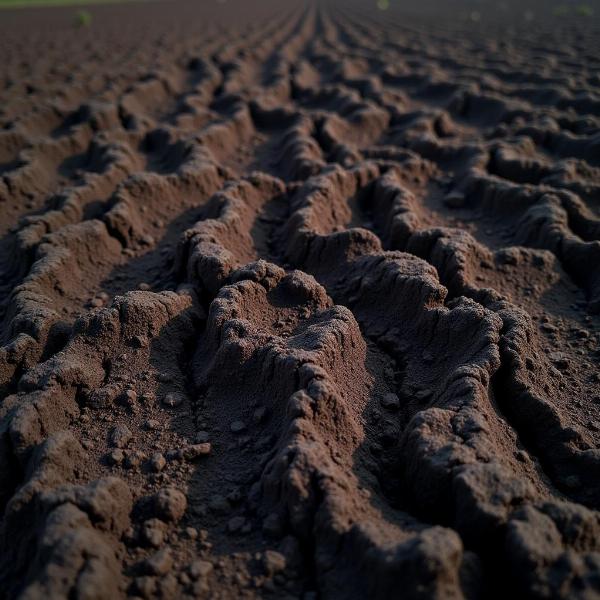Black soil, known for its rich texture and agricultural significance, holds a special place in Indian agriculture. Understanding its meaning in Hindi, along with its properties and uses, is crucial for anyone involved in farming or interested in the Indian agricultural landscape. This article explores the “black soil meaning in Hindi” in detail, providing a comprehensive overview of this vital soil type.
What Does Black Soil Mean in Hindi?
Black soil is commonly referred to as काली मिट्टी (kali mitti) in Hindi. The word “kali” means black, and “mitti” means soil. This simple translation accurately reflects the soil’s dark color, derived from its high clay content and presence of organic matter. While “kali mitti” is the most common term, regional variations exist. For example, in some parts of India, it’s called रेगुर मिट्टी (regur mitti), derived from the Telugu word “reguda,” which also means black. This name emphasizes the soil’s self-plowing properties, making it ideal for certain crops.
 Black Soil in India
Black Soil in India
Properties of Black Soil (काली मिट्टी)
Black soil is renowned for its unique properties, making it highly fertile and suitable for specific crops. These properties include:
- High Clay Content: Black soil possesses a high proportion of clay, contributing to its water retention capacity. This allows the soil to retain moisture for extended periods, beneficial in regions with limited rainfall.
- Rich in Nutrients: Black soil is naturally rich in essential plant nutrients like calcium, potassium, and magnesium. However, it can be deficient in nitrogen and phosphorus, requiring appropriate fertilization.
- Self-Plowing Nature: The high clay content causes the soil to shrink and swell with changes in moisture. This creates cracks during dry periods, allowing for natural aeration and reducing the need for frequent plowing.
- Dark Color: The dark color of black soil is due to the presence of titaniferous magnetite, iron oxides, and humus. This dark color also absorbs heat, influencing the soil temperature.
Crops Suitable for Black Soil
Black soil’s unique characteristics make it ideal for cultivating certain crops. These include:
- Cotton: Black soil is often referred to as “black cotton soil” due to its suitability for cotton cultivation. The soil’s moisture retention and nutrient content are ideal for this crop.
- Sugarcane: The high water-holding capacity of black soil benefits sugarcane, which requires ample moisture throughout its growth cycle.
- Soybean: Black soil provides the necessary nutrients for soybean growth, making it a suitable crop for this soil type.
- Wheat: While not as ideal as for cotton or sugarcane, black soil can support wheat cultivation, especially with proper irrigation and fertilization.
Importance of Black Soil in Indian Agriculture
Black soil plays a crucial role in Indian agriculture, contributing significantly to the country’s food security. Its presence in various states supports the cultivation of essential crops, providing livelihoods for millions of farmers. The soil’s moisture-retaining properties are particularly valuable in regions with erratic rainfall patterns, ensuring crop survival during dry spells.
Challenges and Management of Black Soil
While black soil is highly fertile, it also presents some challenges:
- Difficult to Till When Wet: Due to its high clay content, black soil becomes extremely sticky and difficult to work with when wet.
- Prone to Erosion: The fine texture of black soil makes it susceptible to erosion during heavy rainfall.
- Nutrient Deficiencies: Despite being rich in some nutrients, black soil can be deficient in nitrogen and phosphorus, requiring proper fertilization.
Addressing these challenges requires appropriate soil management practices, including:
- Adding Organic Matter: Improving soil structure and nutrient content.
- Controlled Irrigation: Preventing waterlogging and erosion.
- Balanced Fertilization: Addressing nutrient deficiencies and optimizing crop growth.
Conclusion
Understanding the “black soil meaning in Hindi” and its properties is essential for appreciating its significance in Indian agriculture. From its high water retention capacity to its rich nutrient content, black soil plays a vital role in supporting various crops and livelihoods. Proper management of this valuable resource is crucial for ensuring its long-term productivity and contribution to India’s agricultural landscape.
FAQs
- What is the best crop to grow in black soil? Cotton is considered the most suitable crop for black soil due to its specific needs.
- Why is black soil called regur soil? It is derived from the Telugu word “reguda,” referencing its self-plowing properties.
- Is black soil good for all crops? While suitable for many crops, black soil may not be ideal for all, especially those requiring well-drained soil.
- What are the main problems associated with black soil? Difficulties in tilling when wet, proneness to erosion, and potential nutrient deficiencies.
- How can we improve black soil fertility? Adding organic matter and implementing balanced fertilization strategies.
Meaning-Hindi.in is your trusted partner for professional translation services between Hindi and various other languages. We specialize in Business & Commercial, Legal, Technical, Website Localization, Educational, and Specialized translations. Our expert linguists ensure accurate and culturally sensitive translations tailored to your specific needs. Contact us today for high-quality translation solutions. Email: [email protected], Phone: +91 11-4502-7584. Meaning-Hindi.in offers fast and reliable translation services to bridge the communication gap for your business or personal needs.